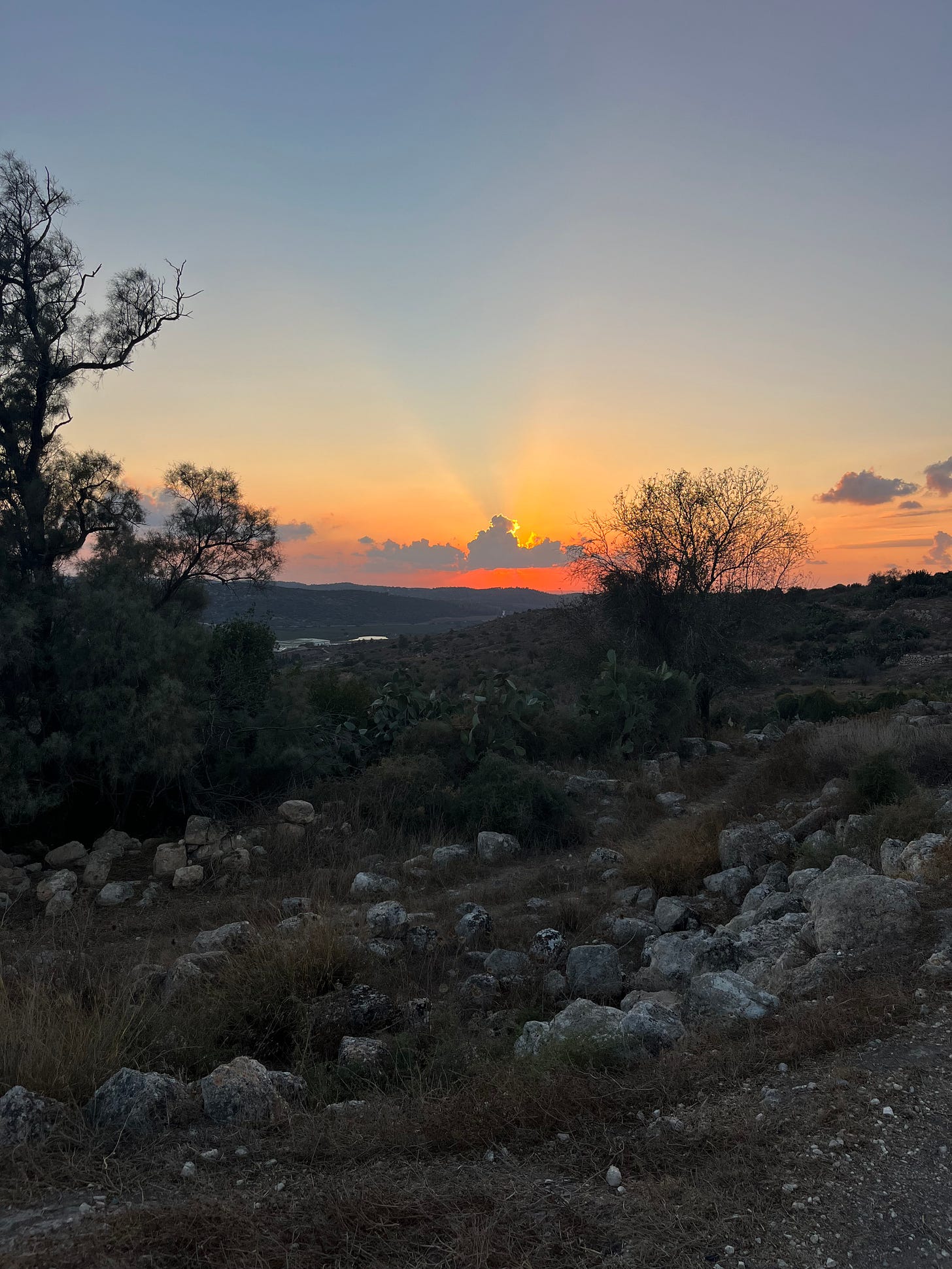Don’t Be Afraid of Fear Itself
Whether fear is paralyzing or galvanizing, there's no way past but straight through.

Dear Healthy Jew,
These are scary times for Jews in Israel and all over the world.
To find growth and God, we must courageously face and embrace fear. Escaping or avoiding fear is dangerous.
Fears - Praiseworthy and Imagined
The Talmud (Gittin 56b) prefaces its accounts of the years leading up to the Second Temple’s destruction in 70 CE with a verse from Mishlei (Proverbs 28:14):
“Praised is the person who is always afraid; but one who hardens his heart will fall bad.”
The implication is clear: that cataclysmic event that has defined the past 2000 years of Jewish history wasn’t triggered by the generation’s iniquities but by their complacency.
Yet not all fears are praiseworthy, clarified the Tosafists (the school of classic 12-13th century commentators on the Talmud).
Imagined fears stem from trying and failing to selfishly control ourselves and everyone around us until - surprise! - we find ourselves unsettled, alone, and afraid. Such paralyzing fears are born from lack of faith in our own capabilities, other people, the laws of nature, and, of course, God. They deliver anxiety, depression, and stress.
Praiseworthy fears, however, result from not taking God’s compassion for granted, and are an integral part of healthy faith. When we know our imperfections, and believe they will be accounted for in God’s perfect justice, we have good reason to be afraid, especially when pain and hardship are all around us.
This galvanizing fear of just retribution breeds sincere prayer and repentance, resulting in forgiveness and salvation. God loves sinners - when said sinners know and own their sins, and are afraid of living in the broken world they’ve created. God’s infinite compassion reaches those who want it, not folks who “harden their hearts.”
When we experience healthy Jewish fear, the Torah instructs us to cry to God for help, as I explained two week ago.
Covering Up Fear
The Jews of ancient Israel trusted their talents and resources to keep themselves safe, so they boldly faced down each other and the Roman authorities. Because they chose self-reliance, God respected their decision and allowed them to face the full consequences of their actions, ending a 420-year period of relatively stable Jewish life in Israel, and heralding millennia of painful wanderings and persecutions.
We have a similar choice in front of us today. Fear is uncomfortable, as are prayer and repentance. It’s much easier to lean on soothing solutions, even if they’re built on fantasy and self-delusion. But to avoid catastrophe, we must face fear, and avoid the following three paths of fear-avoidance.
1. Faith
God will protect us; everything will be fine. God won’t let Israel be destroyed. Just don’t be afraid!
2. Anger
They killed us - we’ll kill them back! Revenge on Hamas and anyone who supports them!
3. Power
We used to be cowardly, exiled Jews, but today we have tanks, fighter jets, and a Qualitative Military Edge. Never again!
Please don’t get me wrong. I’m not dismissing faith, anger, and power.
Judaism, like many religions, is built on faith in God’s existence, perfection, omnipotence, and justice. And it’s probably good to be angry at the murderers of October 7. And I’m immensely grateful to everyone who’s risking their lives to keep us safe, and all the people and nations supporting Israel now.
But we must also take a hard look at the emotions and motives behind faith, anger, and power. Oftentimes, these three feelings aren’t genuine responses but masks covering over plain old fear.
Regarding our present situation, the simple truth is that God already allowed twice for Israel to be conquered and destroyed (in c. 400 BCE and 70 CE), and I’m unaware of God having told any present-day prophets that this time will be different. To the contrary, all biblical prophets are clear that peaceful Jewish presence in Israel is contingent on the satisfactory spiritual condition of the Jewish nation.1
And when anger and power are based on fear, nothing good will come from lashing out irresponsibly and ineffectively. Only after knowing and working through fear can we rationally respond to threats, with or without anger and power.
Last night, during Healthy Jew class at Lev Hatorah, we were sitting on a stone fence watching how our straight backs and poised heads build dignity in our bodies and minds. Then the Iron Dome starts flaring away in the distance. It's all healthy Jewish living, indeed.
Growing in Fear
We must face all of our fears, whether they’re selfish and paralyzing or praiseworthy and galvanizing. Anything is better than hiding behind faith, anger, and power. We can’t afford to “harden our hearts.”
People also often experience different types of fears mixed together. Personally, I’m scared of this war because it threatens my selfish desire to control my life - and because I really don’t know that me and everyone I care about will make it through alive.
Thankfully, when faced with honesty and courage, all fears are paths to growth and God, in strikingly similar ways.
When we’re paralyzed by the failures of exaggerated self-reliance, we admit being afraid and call fear by its name. The natural next step is to let go and turn our lives over to God’s able hands.
When we’re galvanized by fear of God’s judgment, we turn to God in prayer and repentance, again allowing God and His will to enter our minds, hearts, and actions.
For a strategy to directly face fear, check out these posts:
Thank you for reading Healthy Jew.
Here are 2 great paths to continue the journey:
Also check out this intro and index to explore hundreds of posts about our 3 Healthy Jew topics: Wellness with Wisdom, Land of Life (Israel), and Sensible Spirituality.
Finally, always feel free to reach out here with any comments, questions, or complaints:
I look forward to hearing from you!
Be well,
Rabbi Shmuel Chaim Naiman
I won’t even cite a source for this; just open up your Torah and chances our you’ll land by one. If not, head over to Devarim (Deuteronomy); it’s harder to miss them there. If you’re still having trouble, open a siddur to the second paragraph of the Shma prayer which comes from Devorim 11. Whoops, I just gave a source.
In case it wasn’t obvious, I’m not rejecting the spiritual traditions that believe modern Israel is the first harbinger of the Jewish people’s ultimate redemption. Whether or not that process has begun, all religious Jews agree that our nation is still very much in exile, and our redemption will result from prayer and returning to God - not tanks and fighter jets.
How do I know that? Because we still say the daily prayers asking for redemption from exile, and still fast and cry on the days of the year when Jerusalem was besieged, breached, its Temples destroyed, and its last communities dispersed.
Most significantly, a beautiful golden mosque sits on the site of Jerusalem’s unbuilt Third Temple. But please don’t blow it up. If you want the Temple back, do your part by becoming a healthier Jew.









